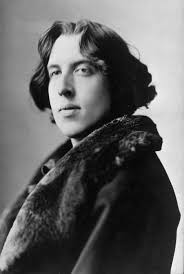The Canterville Ghost Page #2
"The Canterville Ghost" is a short story by Oscar Wilde. It was the first of Wilde's stories to be published, appearing in two parts in The Court and Society Review, 23 February and 2 March 1887.
"I knew Pinkerton would do it," he exclaimed, triumphantly, as he looked round at his admiring family; but no sooner had he said these words than a terrible flash of lightning lit up the sombre room, a fearful peal of thunder made them all start to their feet, and Mrs. Umney fainted. "What a monstrous climate!" said the American Minister, calmly, as he lit a long cheroot. "I guess the old country is so overpopulated that they have not enough decent weather for everybody. I have always been of opinion that emigration is the only thing for England." "My dear Hiram," cried Mrs. Otis, "what can we do with a woman who faints?" "Charge it to her like breakages," answered the Minister; "she won't faint after that;" and in a few moments Mrs. Umney certainly came to. There was no doubt, however, that she was extremely upset, and she sternly warned Mr. Otis to beware of some trouble coming to the house. "I have seen things with my own eyes, sir," she said, "that would make any Christian's hair stand on end, and many and many a night I have not closed my eyes in sleep for the awful things that are done here." Mr. Otis, however, and his wife warmly assured the honest soul that they were not afraid of ghosts, and, after invoking the blessings of Providence on her new master and mistress, and making arrangements for an increase of salary, the old housekeeper tottered off to her own room. II The storm raged fiercely all that night, but nothing of particular note occurred. The next morning, however, when they came down to breakfast, they found the terrible stain of blood once again on the floor. "I don't think it can be the fault of the Paragon Detergent," said Washington, "for I have tried it with everything. It must be the ghost." He accordingly rubbed out the stain a second time, but the second morning it appeared again. The third morning also it was there, though the library had been locked up at night by Mr. Otis himself, and the key carried up-stairs. The whole family were now quite interested; Mr. Otis began to suspect that he had been too dogmatic in his denial of the existence of ghosts, Mrs. Otis expressed her intention of joining the Psychical Society, and Washington prepared a long letter to Messrs. Myers and Podmore on the subject of the Permanence of Sanguineous Stains when connected with Crime. That night all doubts about the objective existence of phantasmata were removed for ever. The day had been warm and sunny; and, in the cool of the evening, the whole family went out to drive. They did not return home till nine o'clock, when they had a light supper. The conversation in no way turned upon ghosts, so there were not even those primary conditions of receptive expectations which so often precede the presentation of psychical phenomena. The subjects discussed, as I have since learned from Mr. Otis, were merely such as form the ordinary conversation of cultured Americans of the better class, such as the immense superiority of Miss Fanny Devonport over Sarah Bernhardt as an actress; the difficulty of obtaining green corn, buckwheat cakes, and hominy, even in the best English houses; the importance of Boston in the development of the world-soul; the advantages of the baggage-check system in railway travelling; and the sweetness of the New York accent as compared to the London drawl. No mention at all was made of the supernatural, nor was Sir Simon de Canterville alluded to in any way. At eleven o'clock the family retired, and by half-past all the lights were out. Some time after, Mr. Otis was awakened by a curious noise in the corridor, outside his room. It sounded like the clank of metal, and seemed to be coming nearer every moment. He got up at once, struck a match, and looked at the time. It was exactly one o'clock. He was quite calm, and felt his pulse, which was not at all feverish. The strange noise still continued, and with it he heard distinctly the sound of footsteps. He put on his slippers, took a small oblong phial out of his dressing-case, and opened the door. Right in front of him he saw, in the wan moonlight, an old man of terrible aspect. His eyes were as red burning coals; long grey hair fell over his shoulders in matted coils; his garments, which were of antique cut, were soiled and ragged, and from his wrists and ankles hung heavy manacles and rusty gyves. "My dear sir," said Mr. Otis, "I really must insist on your oiling those chains, and have brought you for that purpose a small bottle of the Tammany Rising Sun Lubricator. It is said to be completely efficacious upon one application, and there are several testimonials to that effect on the wrapper from some of our most eminent native divines. I shall leave it here for you by the bedroom candles, and will be happy to supply you with more, should you require it." With these words the United States Minister laid the bottle down on a marble table, and, closing his door, retired to rest. [Illustration: "I REALLY MUST INSIST ON YOUR OILING THOSE CHAINS"] For a moment the Canterville ghost stood quite motionless in natural indignation; then, dashing the bottle violently upon the polished floor, he fled down the corridor, uttering hollow groans, and emitting a ghastly green light. Just, however, as he reached the top of the great oak staircase, a door was flung open, two little white-robed figures appeared, and a large pillow whizzed past his head! There was evidently no time to be lost, so, hastily adopting the Fourth dimension of Space as a means of escape, he vanished through the wainscoting, and the house became quite quiet. On reaching a small secret chamber in the left wing, he leaned up against a moonbeam to recover his breath, and began to try and realize his position. Never, in a brilliant and uninterrupted career of three hundred years, had he been so grossly insulted. He thought of the Dowager Duchess, whom he had frightened into a fit as she stood before the glass in her lace and diamonds; of the four housemaids, who had gone into hysterics when he merely grinned at them through the curtains on one of the spare bedrooms; of the rector of the parish, whose candle he had blown out as he was coming late one night from the library, and who had been under the care of Sir William Gull ever since, a perfect martyr to nervous disorders; and of old Madame de Tremouillac, who, having wakened up one morning early and seen a skeleton seated in an armchair by the fire reading her diary, had been confined to her bed for six weeks with an attack of brain fever, and, on her recovery, had become reconciled to the Church, and broken off her connection with that notorious sceptic, Monsieur de Voltaire. He remembered the terrible night when the wicked Lord Canterville was found choking in his dressing-room, with the knave of diamonds half-way down his throat, and confessed, just before he died, that he had cheated Charles James Fox out of £50,000 at Crockford's by means of that very card, and swore that the ghost had made him swallow it. All his great achievements came back to him again, from the butler who had shot himself in the pantry because he had seen a green hand tapping at the window-pane, to the beautiful Lady Stutfield, who was always obliged to wear a black velvet band round her throat to hide the mark of five fingers burnt upon her white skin, and who drowned herself at last in the carp-pond at the end of the King's Walk. With the enthusiastic egotism of the true artist, he went over his most celebrated performances, and smiled bitterly to himself as he recalled to mind his last appearance as "Red Reuben, or the Strangled Babe," his début as "Guant Gibeon, the Blood-sucker of Bexley Moor," and the furore he had excited one lovely June evening by merely playing ninepins with his own bones upon the lawn-tennis ground. And after all this some wretched modern Americans were to come and offer him the Rising Sun Lubricator, and throw pillows at his head! It was quite unbearable. Besides, no ghost in history had ever been treated in this manner. Accordingly, he determined to have vengeance, and remained till daylight in an attitude of deep thought.
Translation
Translate and read this book in other languages:
Select another language:
- - Select -
- 简体中文 (Chinese - Simplified)
- 繁體中文 (Chinese - Traditional)
- Español (Spanish)
- Esperanto (Esperanto)
- 日本語 (Japanese)
- Português (Portuguese)
- Deutsch (German)
- العربية (Arabic)
- Français (French)
- Русский (Russian)
- ಕನ್ನಡ (Kannada)
- 한국어 (Korean)
- עברית (Hebrew)
- Gaeilge (Irish)
- Українська (Ukrainian)
- اردو (Urdu)
- Magyar (Hungarian)
- मानक हिन्दी (Hindi)
- Indonesia (Indonesian)
- Italiano (Italian)
- தமிழ் (Tamil)
- Türkçe (Turkish)
- తెలుగు (Telugu)
- ภาษาไทย (Thai)
- Tiếng Việt (Vietnamese)
- Čeština (Czech)
- Polski (Polish)
- Bahasa Indonesia (Indonesian)
- Românește (Romanian)
- Nederlands (Dutch)
- Ελληνικά (Greek)
- Latinum (Latin)
- Svenska (Swedish)
- Dansk (Danish)
- Suomi (Finnish)
- فارسی (Persian)
- ייִדיש (Yiddish)
- հայերեն (Armenian)
- Norsk (Norwegian)
- English (English)
Citation
Use the citation below to add this book to your bibliography:
Style:MLAChicagoAPA
"The Canterville Ghost Books." Literature.com. STANDS4 LLC, 2024. Web. 22 Dec. 2024. <https://www.literature.com/book/the_canterville_ghost_314>.




Discuss this The Canterville Ghost book with the community:
Report Comment
We're doing our best to make sure our content is useful, accurate and safe.
If by any chance you spot an inappropriate comment while navigating through our website please use this form to let us know, and we'll take care of it shortly.
Attachment
You need to be logged in to favorite.
Log In